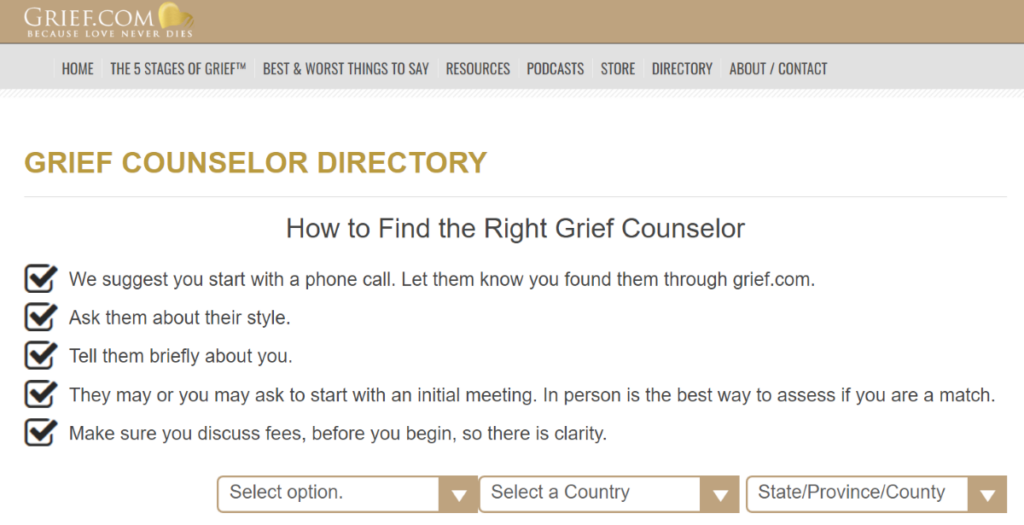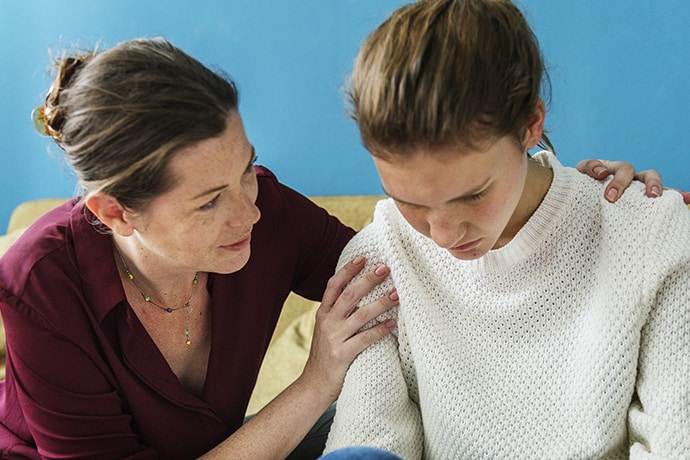Grief counseling for teens is a critical service aimed at helping adolescents navigate the complex emotions and challenges they face during periods of loss.
Teenagers experience a range of distinct issues while grieving, including coping with the expectations of others, managing emotional turmoil, and potentially facing an unfamiliar level of responsibility in their lives.
In this article, you can find four online services that offer grief counseling for teens. Additionally, we’ve explored some techniques and strategies to address grieving in teens.
Grief Counseling Services for Teens
In this section we’ve outlined four services that provide access to experienced counselors who specialize in guiding teens through the grieving process.
| Provider | Good For | Location | Pricing |
|---|---|---|---|
| Teen Counseling | Teens from ages 13-19 | Online therapy | $65 to $90 per week (billed every 4 weeks) |
| Find-a-therapist.com | Finding and contacting the right therapist for you | Online and in-person therapy | Varies depending on the counselor fee |
| TalkSpace | Depression, anxiety, bipolar disorder, OCD, PTSD, LGBTQIA+ therapy | Online therapy | Varies according to insurance coverage or self-pay options |
| Grief.com | Finding a grief counselor near you | Online and in-person therapy worldwide | Varies depending on the counselor fee |
1. Teen Counseling

Nurture your teenager’s well-being through Teen Counseling. Tailored for ages 13-19, their online therapy begins at $65/week. This includes a weekly live session, the flexibility to message your therapist at any time, and the opportunity for parents to connect with therapists. Empower your teen’s journey today with Teen Counseling – start with their online questionnaire.
Note: We collaborate with top-tier mental health companies and receive advertising fees from purchases through the Teen Counseling links.
- Good for: Teens from ages 13-19.
- Location: Online therapy.
- Pricing: $65 to $90 per week (billed every 4 weeks).
- Features: The platform is designed to make finding a therapist easy, message your therapist anytime, live sessions are scheduled weekly and done via live chat, phone, or video call.
Teen Counseling is an online platform that helps teens connect with licensed therapists with experience in diverse mental health issues, including grief and loss. This platform offers flexible scheduling options to accommodate teenagers’ busy schedules, including evening and weekend appointments.
2. Find-a-therapist.com

- Good for: Finding and contacting the right therapist for you.
- Location: Online and in-person therapy.
- Pricing: Varies depending on the counselor fee.
- Features: Filter your search, find accessible and effective online and in-person therapy, find guides on different types of therapy.
Find-a-therapist.com offers an online directory where teens and parents can search for a therapist who offers grief counseling for teens, such as the New Foundation Counseling. There, you can contact therapists directly to schedule a session.
3. TalkSpace

Tailored to individuals, couples, teens, and offering psychiatry services, Talkspace plans kick off at a wallet-friendly $69 per week. What’s more, many health insurances also cover their services, enhancing accessibility and affordability. Complete a questionnaire and get matched with the right therapist for you.
- Good for: Depression, anxiety, bipolar disorder, OCD, PTSD, LGBTQIA+ therapy.
- Location: Online therapy.
- Pricing: Varies according to insurance coverage or self-pay options.
- Features: Accepts insurance, live video sessions and unlimited messaging with your therapist, medication management.
TalkSpace offers mental health services for teens including grief counseling. TalkSpace matches teenagers with a licensed therapist who specializes in working with adolescents. Depending on the teenager’s age and preferences, parents may be involved in their therapy process.
Read our TalkSpace review here.
4. Grief.com

- Good for: Finding a grief counselor near you.
- Location: Online and in-person therapy worldwide.
- Pricing: Varies depending on the counselor fee.
- Features: Online directory, lists the therapists’ contact information, address, and credentials, contact the therapist you choose directly.
Grief.com offers resources and support for teenagers coping with grief and loss. The website offers an online directory with links to therapists’ profiles, organizations, support groups, helplines, and other services for teenagers experiencing grief.
Understanding Grief in Teens

Grief is a profound and complex emotion that touches teenagers’ lives in ways unique to their developmental stage. Understanding grief in teens involves delving into the intricate interplay of emotions, reactions, and the grieving process that arises when they experience loss.
Physical and Emotional Changes
Grieving in teens is complex, as adolescents experience various physical and emotional changes during this period. It is essential to recognize that teenagers may express their grief differently than adults, as they are still developing emotionally and cognitively.
Physical manifestations of grief in teens may include:
- Changes in appetite
- Sleep disturbances
- Fatigue
Emotional symptoms could involve:
- Sadness
- Anger
- Guilt
- Anxiety
- Isolation
- Sense of not being understood by their peers or caregivers
Grieving Process
The grieving process for adolescents encompasses various stages similar to those experienced by adults. However, the process might be experienced differently due to the unique challenges faced by teenagers. These stages include:
- Denial: Teens may refuse to accept the reality of their loss and might try to act as though nothing has happened.
- Anger: Adolescents could feel angry at the person who has died, the circumstances of the death, or even themselves for being unable to prevent the loss.
- Bargaining: It is common to see teenagers bargaining with a higher power, wishing for the deceased to return in exchange for better behavior or other personal sacrifices.
- Depression: A deep sense of sadness can overwhelm adolescents as they come to terms with the permanence of their loss.
- Acceptance: Eventually, teens will start to accept the reality of their loss and learn to cope with it, moving on with their lives.
It is essential to remember that not all teens will linearly go through these stages, and the duration of each stage can vary. Similarly, the intensity of emotions experienced during the grieving process can differ among individuals.
Providing appropriate grief support and understanding the unique challenges adolescents face is crucial in helping them navigate this difficult time.
Types of Grief Support for Teens

The journey through grief is a profound and deeply personal experience, particularly for teenagers who are navigating the challenges of loss amidst the complexities of adolescence.
Recognizing the unique needs and emotions of grieving teens, various types of grief support have emerged to provide solace, understanding, and healing.
From individual grief counseling and peer support grief to dougy center programs, each type of grief support offers a tailored approach to guide teens through their grief journey.
Peer Support Groups
Peer support groups are an essential resource for teens dealing with grief. Adolescents can connect with others experiencing similar feelings and situations in these groups.
The shared experiences create a comforting environment for participants and provide an opportunity to learn from others’ coping strategies.
Grief Counseling
Grief counseling allows teens to express their feelings and navigate their emotions with the guidance of a trained professional. By understanding the stages of grief and learning various coping mechanisms, teens can better manage their feelings of loss and sorrow.
Counseling sessions may be individual or within a group setting, depending on the needs and preferences of the teenager.
Grief counseling can help teens build resilience, improve their emotional well-being, and prevent the development of more severe mental health issues such as prolonged grief or depression.
Therapists Specializing in Grief
Dougy Center Programs
The Dougy Center is specifically dedicated to providing grief support services for children, teens, and their families. They offer several programs to help adolescents cope with their feelings of loss and grief.
Their programs are designed to provide a safe space for teens to express their emotions, engage in various therapeutic activities, and receive support from trained staff and their peers.
Coping Strategies for Grieving Teens

Grieving teens face unique challenges, as they are often still developing coping skills and navigating their own identities. Providing appropriate support can make all the difference in helping them heal and grow.
In this section, we’ll discuss some coping strategies that may benefit grieving teens.
Self-Care
One important aspect of coping is practicing self-care. Encourage teens to maintain a healthy lifestyle by eating well, exercising regularly, and getting enough sleep. Grieving can affect one’s physical and mental well-being, so adolescents must prioritize their health during this time.
Hope
Teens may also find comfort and solace in their faith. This can provide a sense of belonging and hope, as well as an understanding of death and the concept of immortality. Exploring and embracing their beliefs can help grieving teens make sense of their loss and find a sense of meaning in their grief.
Social Support
Developing a support network is vital for grieving adolescents. Social support can come in many forms, such as family, friends, or counselors, and can help provide an outlet to share feelings and process the loss. Encourage teens to attend grief support groups or seek professional help when needed.
Open Communication
Normalizing the grieving process and encouraging open communication about the loss is essential. This can help reduce feelings of isolation and stigmatization that may hinder the healing process.
Providing a safe space for teens to express their emotions and ask questions about death and grief can foster a sense of understanding and acceptance.
Tools and Techniques in Grief Therapy
Grief therapy for teens often involves using various tools and techniques to help adolescents navigate the complex emotions they may experience during the grieving process.
One of the key objectives for a grief therapist is to provide a safe and supportive environment for the teen to explore their feelings, process their emotions, and develop coping strategies.
Journaling

Journaling can be a powerful technique for teens experiencing grief. Encouraging them to write about their thoughts and feelings on a regular basis can help facilitate emotional expression, self-reflection, and, eventually, healing.
Music Therapy
The grief songwriting process is another creative expression technique that incorporates music therapy into the grieving process. Teens can write and perform songs to help process their feelings and explore the different stages of grief.
Reading
Reading and sharing stories about others who have experienced similar losses can also be a helpful method for teens to relate and feel less isolated in their grief.
Therapists can provide various resources, such as books or articles that address specific grief issues, to help normalize the adolescents’ emotions and promote understanding.
Podcasts
Listening to podcasts about grief and loss is another valuable tool that can provide educational resources and accounts of personal experiences.
Teens can be encouraged to listen to podcasts that resonate with their circumstances to understand their feelings better and learn healthy coping mechanisms.
Cognitive Therapy
In addition to these techniques, therapists may use a mixture of cognitive-behavioral therapy, trauma-focused therapy, and expressive arts therapies to address the specific needs of grieving teens.
Therapists can employ various approaches and tools, such as grief-specific assessments, memory-making activities, and role-playing exercises, to support the healing process of bereaved adolescents.
Narrative Therapy
Narrative therapy helps teens externalize their grief by viewing it as a separate entity from themselves. By personifying their grief, teens can gain a sense of agency and control over their emotions and experiences.
This allows them to explore their grief from a more objective standpoint and reduces the sense of overwhelm often associated with intense emotions.
The Role of Professional Therapy

Professional therapy can play a crucial role in helping teens navigate the complex grieving process by providing targeted support and coping strategies.
When to Seek Therapy
Grieving is a natural part of life, and each person experiences it in a unique way. The grieving process can be more challenging for teenagers due to their ongoing development and various social pressures.
It’s essential to recognize when a teen might benefit from the support of professional therapy. Some signs to look for include:
- Difficulty with attention and concentration in school or daily life
- Persistent feelings of sadness, anxiety, or anger
- Withdrawal from relationships, hobbies, or social activities
- Disturbances in sleep or appetite patterns
- Unhealthy coping mechanisms, such as substance abuse
Benefits of Therapy
Professional therapy offers adolescents a safe and supportive environment to address their grief and develop healthy coping strategies.
Some of the key benefits of therapy for grieving teens include:
- Guidance through the grieving process: A therapist can help teens understand the stages of grief and provide the tools needed to navigate this difficult time.
- Emotional management: Teens often experience intense emotions during grief, such as sadness, anger, and anxiety. Therapy can help them learn to express and manage their feelings in a healthy way.
- Improved relationships: Grieving can strain a teen’s relationships with friends and family, creating feelings of isolation. Therapy can help them reconnect with others and forge new connections.
- Support in establishing rituals: Creating rituals to remember and honor the deceased is essential to the grieving process. A therapist can guide teens in developing meaningful rituals that facilitate healing and remembrance.
- Addressing potential mental health issues: Sometimes, unresolved grief can lead to mental health problems, such as depression or anxiety disorders. Therapy can help identify and address these issues if they arise.
Final Thoughts
Grief counseling for teens plays a significant role in helping adolescents cope with losing a loved one or peer. During this challenging time, teens experience a wide range of emotions, and professional support can provide both comfort and guidance.
Identifying the most suitable strategies for teens dealing with grief is essential, as each individual’s needs may differ. By offering a variety of counseling approaches and incorporating support from families, peers, and creative outlets, grief counseling can significantly impact an adolescent’s healing process and emotional well-being during an incredibly challenging time in their life.
Frequently Asked Questions
What are common signs of grief in teenagers?
Grieving teenagers may experience a wide range of emotions and behaviors as they cope with their loss.
Some common signs of grief in teenagers include mood swings, irritability, withdrawal from social activities, changes in sleep and appetite, difficulty concentrating, and physical symptoms such as headaches or stomachaches.
It’s important to remember that every teenager’s grief experience will be unique, and they may exhibit some or none of these signs when grieving.
How can therapy help a grieving teen?
Therapy can provide a safe space for grieving teenagers to express their feelings and process their loss. A trained grief counselor can help teens understand and navigate the stages of grief and develop healthy coping mechanisms to deal with their emotions.
Through therapy, teens may also gain insight into unresolved feelings or complicated grief and receive guidance on moving forward through the healing process.
What coping strategies are effective for grieving teens?
Various coping strategies can be effective for grieving teenagers, and these may vary depending on the individual’s personality and preferences. Some helpful strategies include:
- Encouraging creative expression through activities such as art, journaling, or music
- Engaging in mindfulness and relaxation techniques, such as deep breathing exercises or guided visualization
- Keeping a routine or participating in extracurricular activities to maintain a sense of normalcy
- Seeking support from friends, family, or a support group specifically designed for grieving teens
How can parents and caregivers provide support during the grieving process?
Parents and caregivers can play a crucial role in helping teenagers navigate their grief. Some ways to provide support include:
- Offering a listening ear and emotional support without judgment or criticism
- Encouraging open communication and facilitating discussions about grief and loss
- Providing a stable and nurturing environment at home, with routines in place for daily activities
- Encouraging grieving teens to seek professional help, such as therapy or bereavement support programs, if necessary
References
Muselman, D. M., & Wiggins, M. I. (2012). Spirituality and loss: Approaches for counseling grieving adolescents. Counseling and Values, 57(2), 229-240. Link.
Underwood, M., McGuinness, S., & D’Amore, N. (2016). Child and Adolescent Grief and Loss. Handbook of Child and Adolescent Group Therapy, 401-410. Link.






